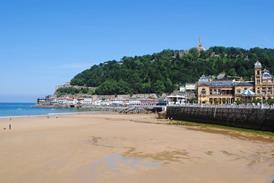Dir. Sean McAllister. UK-Den. 2004.75mins.
A documentary that goes behind the dailyheadlines out of Iraq, The Liberace OfBaghdad focuses on a pianist whose professional career came to an abruptend with the toppling of Saddam. Shot over eight months in Baghdad in 2004 attremendous peril to its director Sean McAllister, not to mention his subject,the film provides a vital insight into the impact on civilian life of theUS-led invasion and occupation.
The film, which premiered at SheffieldInternational Documentary Festival in November, won a special jury prize atSundance this year after screening in the newly-launched World DocumentaryCompetition. While continued festival play is assured, the film's internationaltheatrical prospects - it has already aired on the BBC in the UK - will dependon finding niche distributors who can lever the strong interest in Iraq and thehigh curiosity value of its idiosyncratic subject.
McAllister, whose 1998 documentary
Sent on a recce to Iraq by the BBC to finda story about everyday life in Baghdad, he passed several fruitless weekschasing leads, returning each evening to his hotel to chat with the pianist inthe lounge. Soon, he realised the pianist was the story and ending up spendingmost of the year eating, drinking and bunking with him. The film is culled from110 40-minute tapes, from which editor Ollie Huddleston has done a remarkablejob of extracting a nicely focused 75 minutes.
Peter, a Christian Arab, left Iraq in his20s to study piano in Italy. When he returned Saddam was in charge and was beginninghostilities against neighbouring Iran. Peter was forced to join the army,served on the front and killed.
After demobilisation he returned toBaghdad, started a family (his wife, a doctor, delivered one of Saddam'sdaughter) and slowly began to build a name as an instructor and performer. Athis height he was earning $10,000 a month, enjoying a vast wardrobe andengaging in multiple affairs to the extent that his lavish lifestyle lead tothe self-imposed moniker the Liberace of Baghdad.
The title puts the joke on Peter,especially for Western viewers for whom Liberace is better known as a camp iconrather than a style-setter. Indeed, judging by his few performances in thefilm, Peter's piano playing doesn't correspond with his claims or his aspirationsto be the "Chopin of Iraq".
But this only adds to the allure of thisincongruous character with the hooded eyes and unfortunate pony-tail. With acigarette perpetually between his lips, Peter proves a pragmatic guide to lifeduring wartime: his mood, and hence the tone of the film, oscillates betweenbitingly satirical and deeply depressed.
Forays to and from the hotel and Peter'ssuburban home continually darken that tone: a suicide bomb's aftermath forcesthem to walk, leading to an impromptu encounter with a woman's whose son islikely a victim of the attack.
Ironically, despite the promisedliberation, Peter's great desire is to leave Iraq for the US where hisestranged wife and two of their four children reside. Meanwhile, McAllisterspends time with the two adult children who have remained in Baghdad; thedaughter is particularly vociferous about the failed promise of the USoccupation and yearns for the days of Saddam. Her steely reserve is shatteredby the death of a neighbour, murdered for working with a US company.
What sets the film apart is the rapportbetween journalist and subject - McAllister and Peter were on top of each otherduring the shooting, hunkering down against air raids - and the camera is verymuch an extension of McAllister with the viewer is along for the ride.
As the weeks pass, and the kidnappings andbeheadings of foreigners escalates, the film begins to feel like all-too-realreality TV. It reaches a climax when the pair become lost on the drive toPeter's house - street lights and traffic lights are things of the past - andend up in the no-man's-land that is the airport highway. As the two men, withcracking voices, attempt to joke that this may be the end of the film, andMcAllister cringes with his camera into the passenger seat, one can't helpdoing the same.
Prodcos: Tenfoot Films/Team Production
Int'l sales: TV 2 World, (45) 3537 22 00
Exec prods: Mette Heide, Nick Fraser, Mette Hoffmann Meyer
Prod: Sean McAllister
Ed: Ollie Huddleston
Mus: Samir Peter
















![[L-R]: Amanda Villavieja, Laia Casanovas, Yasmina Praderas](https://d1nslcd7m2225b.cloudfront.net/Pictures/274x183/6/4/1/1471641_pxl_20251224_103354743_618426_crop.jpg)


No comments yet